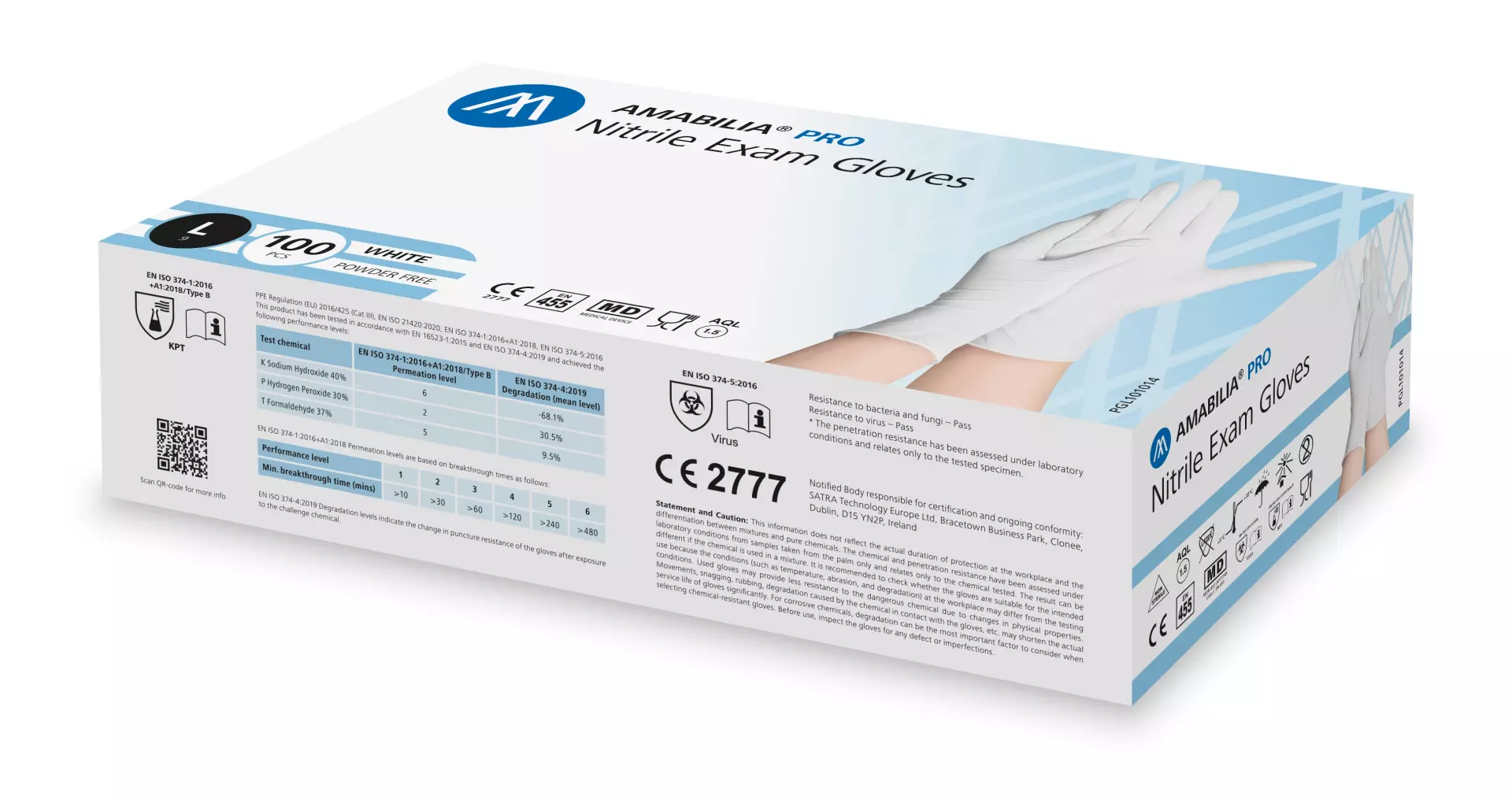
Amabilia Pro Nitrile Exam Glove White
Amabilia Pro Nitrile Exam Glove White
(23)

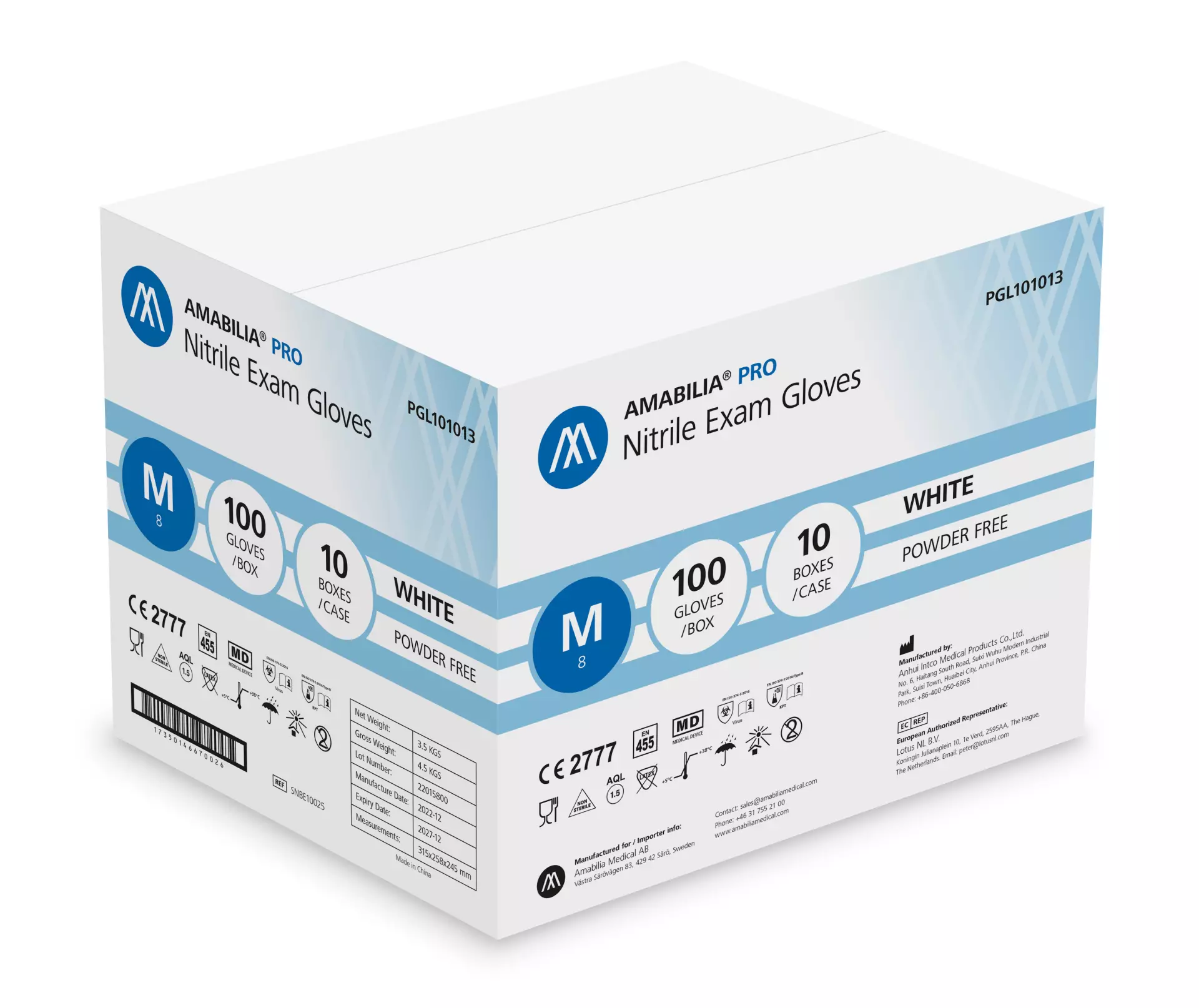
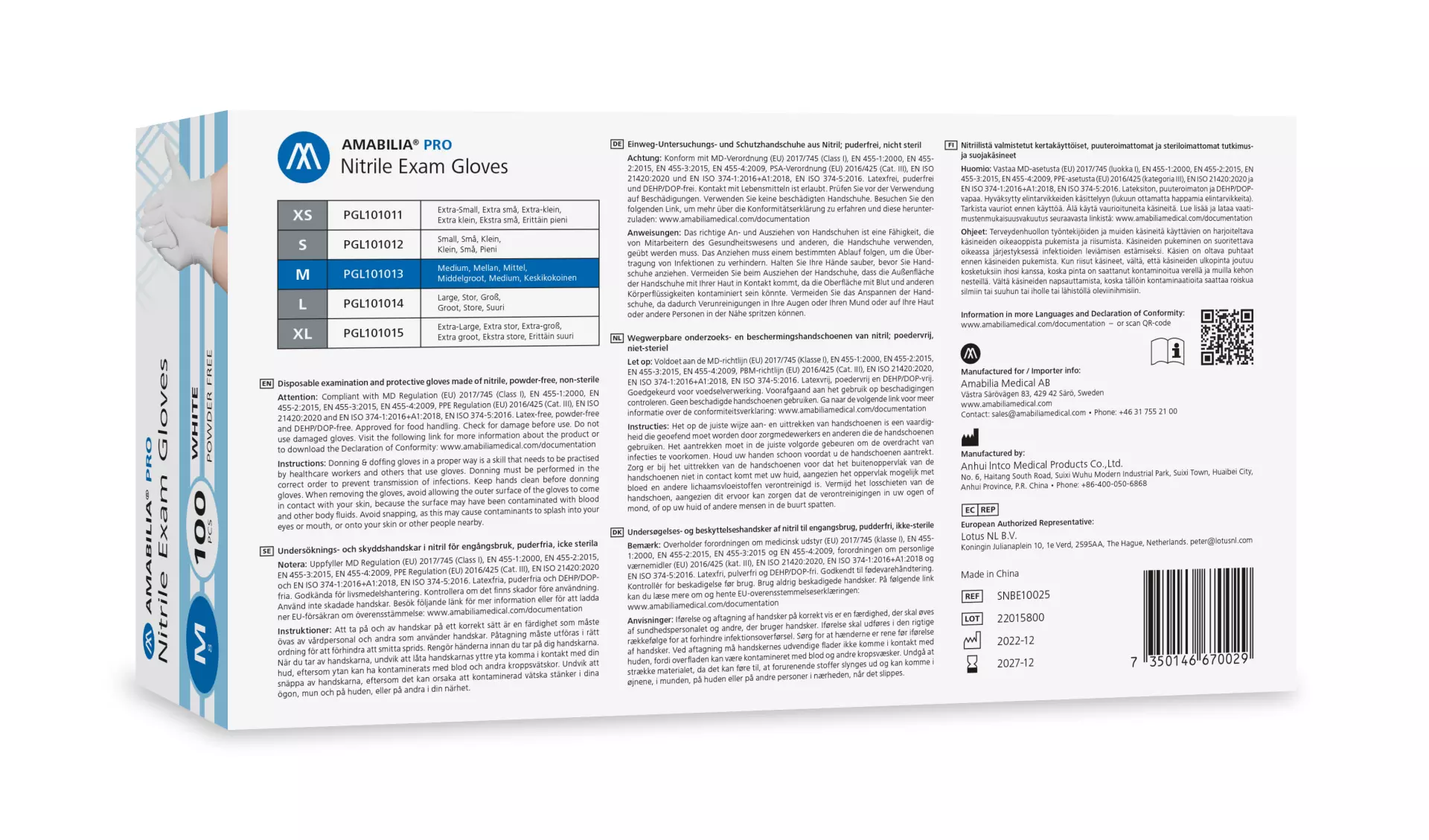



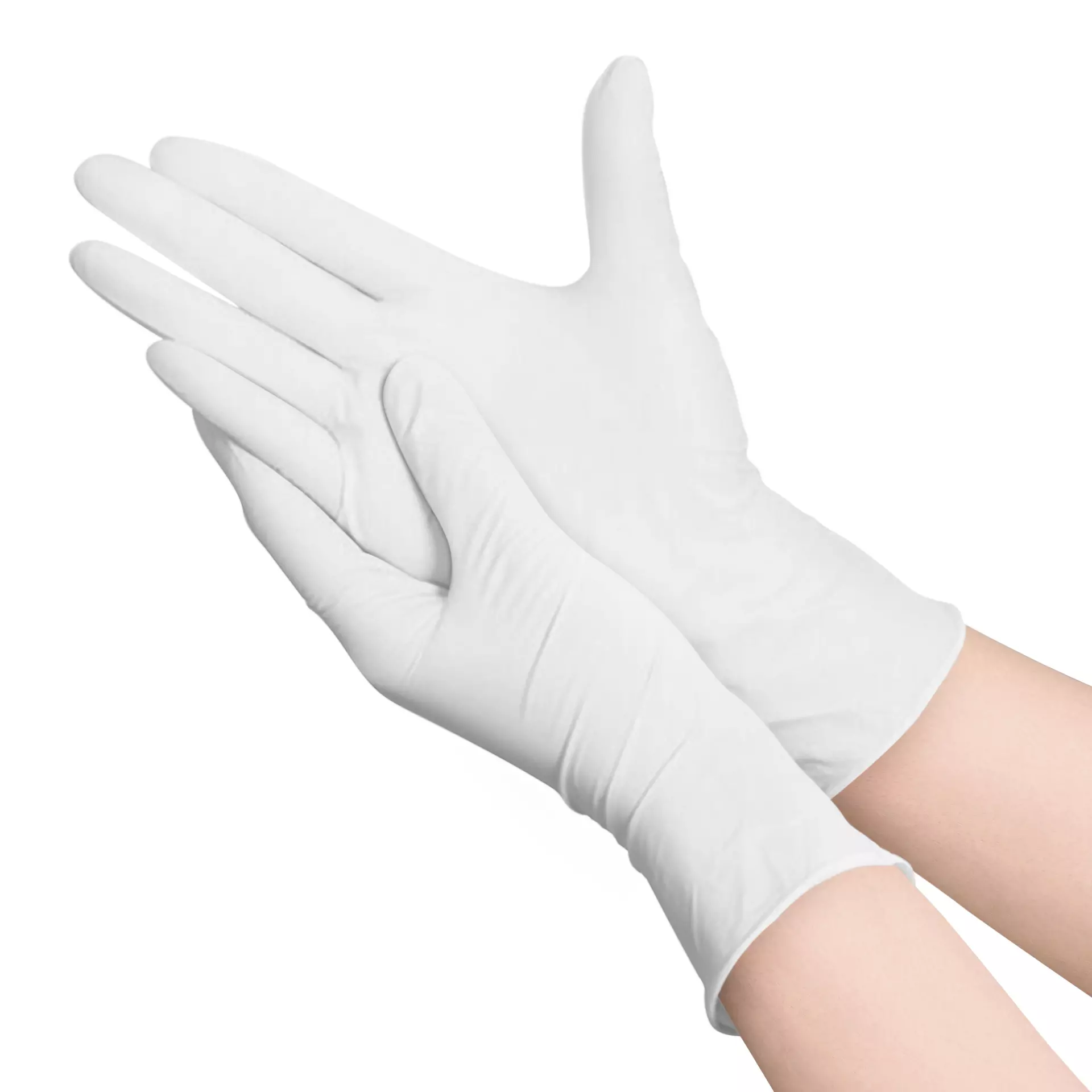
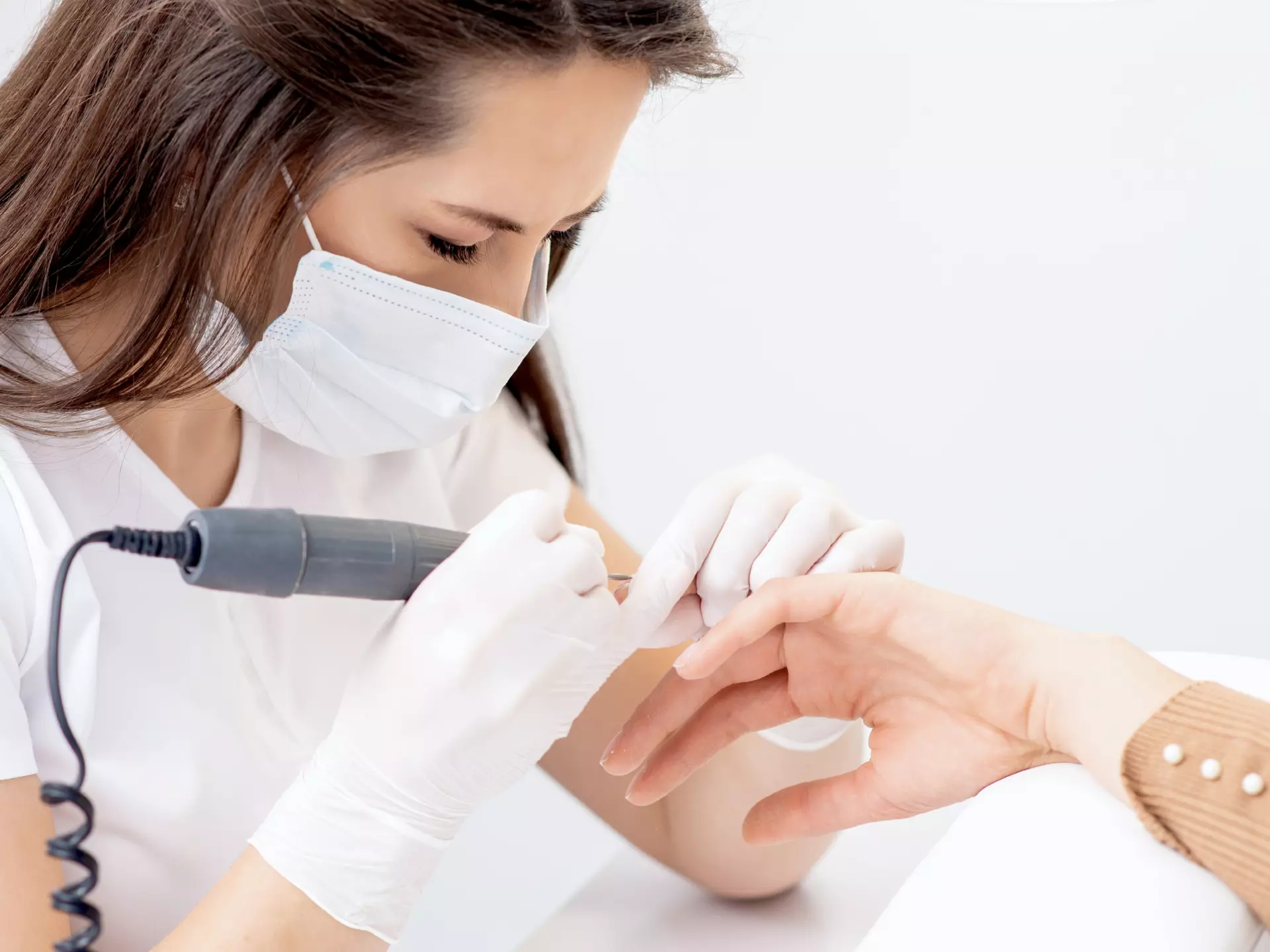
Features You'll Love

Cuff Style · Rolled
The design of the wrist opening, affecting ease of putting gloves on, comfort, and how securely they stay in place during use.
The design of the wrist opening, affecting ease of putting gloves on, comfort, and how securely they stay in place during use.
The design of the wrist opening, affecting ease of putting gloves on, comfort, and how securely they stay in place during use.

Surface · Smooth
The texture of the glove exterior, affecting grip strength and handling capability for different tasks and working conditions.
The texture of the glove exterior, affecting grip strength and handling capability for different tasks and working conditions.
The texture of the glove exterior, affecting grip strength and handling capability for different tasks and working conditions.
46,36 €
Price per 10 packages (1 000 pcs)
4,64 € / 100 pcs
Shipping fee is 7,95 € for orders under 80,00 €
Features You'll Love

Cuff Style · Rolled
The design of the wrist opening, affecting ease of putting gloves on, comfort, and how securely they stay in place during use.
The design of the wrist opening, affecting ease of putting gloves on, comfort, and how securely they stay in place during use.
The design of the wrist opening, affecting ease of putting gloves on, comfort, and how securely they stay in place during use.

Surface · Smooth
The texture of the glove exterior, affecting grip strength and handling capability for different tasks and working conditions.
The texture of the glove exterior, affecting grip strength and handling capability for different tasks and working conditions.
The texture of the glove exterior, affecting grip strength and handling capability for different tasks and working conditions.
Product description
The product description has not been specified
The product description has not been specified
The product description has not been specified
Describes the surface texture of the fingertip area, affecting grip strength and tactile sensitivity during use.
Provides comfort and peace of mind, free from natural rubber latex to protect sensitive skin.
Protects sensitive surfaces from silicone contamination, ensuring product integrity and quality.
Effortlessly use touch screens without removing your gloves, ensuring continuous protection and hygiene.
Your go-to gloves for diverse tasks, offering reliable protection and convenience across many applications.
Complete finger coverage ensures full protection and hygiene for your hands, maintaining dexterity for all tasks.
Indicates whether gloves contain powder on the interior surface to aid donning, affecting ease of use and contamination control requirements.
The texture of the glove exterior, affecting grip strength and handling capability for different tasks and working conditions.
The visual appearance of the glove material, ranging from basic colors to specialized options for different professional and aesthetic preferences.
The base substance used to manufacture the glove, affecting chemical resistance, durability, flexibility, and compatibility with specific applications.
Measures the thickness of the glove's wrist/forearm extension, affecting durability, tear resistance, and protection level during use.
Measures the material thickness at the fingertips, affecting tactile sensitivity, dexterity, and protection level during use.
Measures how far the glove extends up the wrist and forearm, determining the level of coverage and protection provided during use.
Measures the material thickness at the palm area, affecting protection level and tactile sensitivity during use.
Indicates the maximum percentage of defective gloves acceptable in quality testing, with lower numbers representing higher quality standards.
Indicates how long gloves maintain their protective properties and quality when stored properly, typically measured in years from manufacture date.
Total mass of the glove package, useful for shipping calculations, storage planning, and comparing product quantities across different brands.
The design of the wrist opening, affecting ease of putting gloves on, comfort, and how securely they stay in place during use.
- Chemical Resistance
- Food Service
- Medical Protection
- Antimicrobial Protection
- Hand Protection
Protective gloves, mittens, and arm protectors with the EN 21420 rating are tested for general requirements like chemical safety, comfort, fit, and dexterity. This ensures the products themselves are safe to wear, will not cause harm, and allow you to work effectively.
Protective clothing, gloves, and footwear materials with the EN 16523-1:2015+A1:2018 rating are tested for resistance to permeation by hazardous liquid chemicals. This means the material provides a measured level of protection against chemicals passing through it, helping you choose safety gear that resists liquid chemical exposure.
Single-use medical gloves with the EN 455-3 rating are tested for biological safety, including potential chemical residues, latex proteins, and powder content. This ensures the gloves are safe for skin contact, minimizing the risk of irritation or allergic reactions for users and patients.
Gloves with the EN 374-4 rating are tested for resistance to degradation, which is how the glove material changes after chemical contact. This ensures the gloves maintain their protective strength and barrier, keeping your hands safe from hazardous chemicals.
Gloves with the EN 374-1:1995 rating are tested for their ability to protect against dangerous chemicals and microorganisms, by measuring resistance to chemicals seeping or leaking through the material. This ensures the gloves provide a reliable barrier for user safety.
Test results
This glove provides moderate protection against chemicals, resisting permeation for at least 30 minutes for a minimum of three specific test chemicals. It is suitable for tasks involving handling certain chemicals where prolonged contact is not expected.
Gloves with the EN 374-5:2016 rating are tested for resistance to penetration by bacteria and fungi, and potentially viruses. This means the gloves provide a protective barrier against microorganisms, helping to keep your hands safe from harmful biological agents.
Test results
This glove is tested to protect you from bacteria, fungi, and viruses. It provides a reliable barrier, having passed specific tests to ensure no leakage when exposed to these micro-organisms, making it suitable for handling contaminated materials.
Gloves with the EN 374-2 rating are tested for resistance to penetration by liquids and microorganisms. This means the glove material is checked for physical defects like pinholes or leaks, ensuring it forms a barrier against harmful substances. You can trust these gloves to be waterproof and block microorganisms.
Gloves with the EN 374-3 rating are tested for their resistance to permeation by hazardous chemicals. This measures how long it takes for dangerous liquids to break through the glove material, helping you select the right protection for working with chemicals.
Medical gloves with the EN 455-2 rating are tested for physical properties like dimensions and strength, including force at break both before and after aging. This ensures the gloves fit correctly, are durable, and provide reliable protection against cross-contamination for both patient and user.
Medical gloves with the EN 455-1 rating are tested for freedom from holes to ensure they act as an effective barrier. This means the gloves reliably protect users and others from the transmission of microorganisms and contamination.
Medical gloves with the EN 455-4 rating are tested for their shelf life, ensuring they maintain critical properties like strength and barrier integrity over time. This means you can trust that the gloves will remain effective and safe to use until their expiration date, providing reliable protection when needed.
Medical devices with the ISO 13485 rating are tested for their manufacturer's quality management system, ensuring consistent safety and effectiveness. This means you can trust that these products are made with strict quality controls to help ensure they are safe and reliable for their intended use.
Plastic food contact materials with the EN 1186-1 rating are tested for how much of their components can transfer into food. This ensures that products like containers and kitchenware are safe to use, preventing unwanted substances from leaching into your meals.
Plastic food containers and packaging with the EN 13130-1 rating are tested for the specific transfer of substances from plastics into food or food simulants. This ensures that these products do not release harmful chemicals into your food, helping to protect your health.
Protective gloves with the EN 420:2003+A1:2009 rating are tested for general design, safe materials (innocuousness), water penetration, comfort, and dexterity. This ensures the gloves are safe, fit correctly, and allow you to perform tasks effectively without discomfort.
Products from organizations with the EN 19001 rating are tested for the effectiveness of their internal management system audits. This means the company thoroughly reviews its own quality and environmental processes, aiming for consistent product improvement and reliability.
Food safe refers to the safety of food products that are used or consumed by people. In Europe, food safety is regulated by the European Union (EU) and the European Food Safety Authority (EFSA). These organizations set standards and requirements for food products to ensure they are safe to eat. To be considered "food safe" in Europe, a product must meet these standards and be free of harmful substances. This includes being free of harmful bacteria, pesticides, and other contaminants. Food products that do not meet these standards cannot be sold or used in the EU.
Free delivery when you order more than 80,00 € from Amabilia Medical
Supplier shipping fee 7,95 €
Brand minimum 100,00 €
Other products you may like
Similar products you may like
Find +150,000 products from hundreds of brands